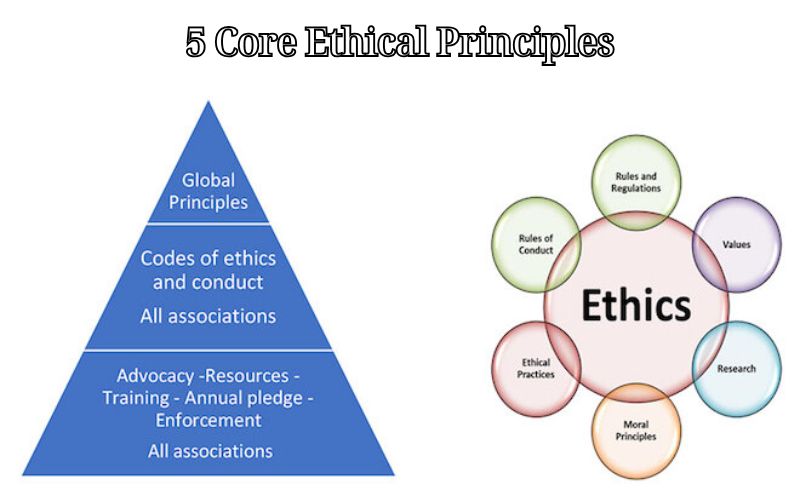Ethics guide how individuals and organizations make decisions, interact with others, and uphold moral values. They serve as a compass for navigating complex situations with fairness and respect. Among the many ethical frameworks, 5 Core Ethical Principles stand out as fundamental across professions, cultures, and contexts.
In this article, Poufj.xyz will explore these 5 Core Ethical Principles—autonomy, beneficence, non-maleficence, justice, and fidelity—and how they can be applied in daily life and professional settings to build trust, ensure fairness, and promote well-being.
5 Core Ethical Principles: Foundations of Integrity and Trust
1. Autonomy: Respect for Individual Freedom
Definition
Autonomy refers to the right of individuals to make their own decisions and control their lives. This 5 Core Ethical Principles emphasizes respecting a person’s ability to act according to their values and preferences, provided their actions do not harm others.
Applications
- Healthcare: Doctors must inform patients about treatment options and respect their choices, even if they decline medical interventions.
- Workplace: Managers empower employees by allowing them to take ownership of their roles and make decisions within their scope of responsibility.
- Everyday Life: Respecting a friend’s choice to pursue a lifestyle or career path, even if it differs from your own.
Why It Matters
Upholding autonomy fosters mutual respect and empowers individuals to take responsibility for their decisions. It also ensures transparency and trust in relationships.
2. Beneficence: Acting in the Best Interest of Others
Definition
Beneficence involves actively promoting the well-being of others and taking actions that contribute to their happiness, health, and success. It is not just about avoiding harm but also about doing good.
Applications
- Healthcare: Medical professionals provide treatments that aim to improve a patient’s quality of life.
- Education: Teachers go beyond academic instruction to support students’ emotional and social development.
- Community Work: Volunteers contribute to projects that enhance the living conditions of disadvantaged groups.
Why It Matters
Beneficence inspires acts of kindness and generosity, strengthening communities and building relationships based on care and compassion.
3. Non-Maleficence: Do No Harm
Definition
Non-maleficence is the obligation to avoid causing harm to others, whether intentionally or unintentionally. It is a cornerstone of ethical conduct, ensuring that actions do not negatively impact others’ well-being.
Applications
- Healthcare: Avoiding treatments that may harm patients more than they help.
- Business: Ensuring products and services are safe for consumers and do not exploit vulnerable groups.
- Environment: Companies adopting sustainable practices to prevent harm to the planet.
Why It Matters
Non-maleficence encourages individuals and organizations to consider the potential consequences of their actions, promoting accountability and minimizing risks.
4. Justice: Fairness and Equity
Definition
Justice is the 5 Core Ethical Principles of treating people fairly and ensuring equitable distribution of resources, opportunities, and responsibilities. It involves impartiality and the consistent application of rules.
Applications
- Legal Systems: Judges uphold justice by ensuring fair trials and unbiased rulings.
- Workplace: Employers provide equal pay for equal work and create inclusive environments.
- Public Policy: Governments design programs to address social inequalities and promote equal access to education and healthcare.
Why It Matters
Justice builds trust and cohesion in societies, ensuring that everyone has an equal opportunity to succeed and thrive.
5. Fidelity: Building Trust Through Loyalty
Definition
Fidelity emphasizes loyalty, honesty, and maintaining commitments. It involves being true to your word and upholding trust in relationships and professional practices.
Applications
- Healthcare: Doctors maintain confidentiality and honor the trust placed in them by patients.
- Business: Companies deliver on promises made to customers and stakeholders.
- Friendships: Individuals keep confidences and honor commitments to strengthen bonds.
Why It Matters
Fidelity strengthens relationships by fostering trust, reliability, and integrity. It encourages accountability and consistency in interactions.
Integrating 5 Core Ethical Principles in Daily Life
Applying these 5 Core Ethical Principles requires conscious effort and reflection. Here are some practical ways to incorporate them into your life:
- Self-Reflection: Regularly evaluate whether your decisions align with your values and consider their impact on others.
- Empathy: Practice understanding others’ perspectives to make fair and compassionate choices.
- Transparency: Be honest about your intentions and communicate openly to maintain trust.
- Continuous Learning: Stay informed about ethical challenges and seek guidance when faced with complex decisions.
Why These 5 Core Ethical Principles Are Universal
The five core ethical principles transcend cultures, professions, and contexts because they are rooted in human values and the desire for harmonious coexistence. They:
- Provide a framework for resolving conflicts.
- Build stronger, more equitable societies.
- Guide individuals in making morally sound decisions.
5 Core Ethical Principles in Professional Contexts
Healthcare
Doctors, nurses, and other medical professionals rely on these 5 Core Ethical Principles to provide ethical care. Autonomy, beneficence, and non-maleficence guide patient-centered approaches, while justice ensures fair access to resources.
Business
Organizations use ethical 5 Core Ethical Principles to build trust with stakeholders. Fidelity ensures honest communication, while justice promotes equality among employees.
Education
Teachers uphold justice by treating students fairly, beneficence by supporting their growth, and fidelity by maintaining their commitments to students and families.
Conclusion
The 5 Core Ethical Principles—autonomy, beneficence, non-maleficence, justice, and fidelity—form the foundation of ethical behavior across all walks of life. By applying these 5 Core Ethical Principles, individuals and organizations can navigate challenges with integrity, build trust, and contribute to a fairer and more compassionate world.
